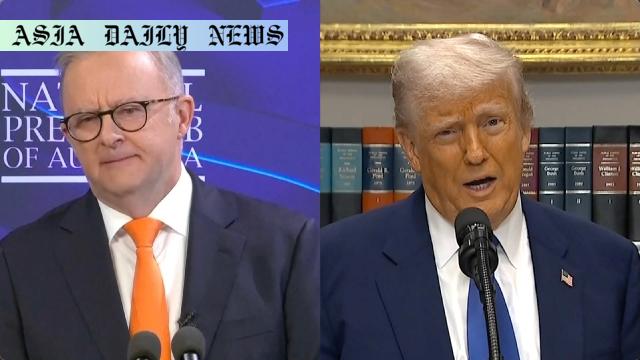AUKUS faces a setback due to Trump’s early departure from the G7 summit, hindering Albanese’s efforts to promote the pact.

Cancelled Meeting Between Trump and Albanese
The scheduled meeting between former U.S. President Donald Trump and Australian Prime Minister Anthony Albanese came to an unexpected halt following Trump’s abrupt departure from the G7 Summit in Canada. The meeting was expected to serve as a critical opportunity for Albanese to advocate the importance of the AUKUS (Australia-United Kingdom-United States) strategic defense pact. However, Trump’s early exit from the summit prevented meaningful dialogue on the issue. Without face-to-face discussions between the two leaders, Albanese’s agenda to bolster the trilateral partnership has encountered significant obstacles.
Critical Role of AUKUS in Regional Security
AUKUS holds strategic importance for Australia, the UK, and the US, in addressing growing geopolitical threats in the Pacific region, particularly as a counter-measure to China’s increasing influence. At the heart of the agreement lies the transfer of advanced defense capabilities, including the procurement of nuclear-powered Virginia-class attack submarines by Australia. These submarines would provide an unprecedented upgrade to Australia’s naval capacity, enabling it to play a pivotal role in regional security. In preparation for the summit, Albanese emphasized how close cooperation under AUKUS aligns with U.S. strategic interests, reinforcing the need for cohesive actions among allies in the Pacific theater.
The ‘America First’ Agenda vs. Allied Collaboration
President Trump’s administration has been noted for prioritizing an ‘America first’ agenda, which often places domestic considerations above international partnerships. According to reports, the Pentagon is currently reassessing AUKUS to ensure that its framework aligns with Trump’s policy objectives. While British Prime Minister Keir Starmer commented on the continuation of the submarine deal during his meeting with Trump, it remains uncertain how the broader security framework will be affected. Albanese, undeterred, acknowledged Starmer’s remarks as a positive sign amidst ongoing evaluations of the pact’s alignment with U.S. priorities.
Implications for Australia
For Australia, AUKUS is not merely a defense agreement but a vital component of its long-term security policy. As China continues to assert its presence in the Pacific, AUKUS represents a collaborative effort to maintain a balance of power in the region. Australian officials have expressed optimism regarding the eventual fruition of the submarine deal, underscoring the unmatched technological and strategic advantages such an investment offers. Nevertheless, the challenge remains in gaining full transnational support and overcoming procedural hurdles that currently stand in the way of expedited progress.
The Path Forward
Moving forward, addressing the challenges to AUKUS requires diplomatic finesse and clear communication among all parties involved. While the lack of direct talks with Trump at the G7 represents a setback, Australian leadership remains committed to advocating for the pact’s viability. Strengthening trilateral trust and coordination will be essential not only for completing the current submarine deal but also for ensuring long-term success in regional security initiatives. The vision for a cohesive AUKUS partnership transcends individual leadership dynamics, relying instead on the shared strategic objectives of its member nations.
Commentary
The Missed Opportunity at G7
The cancellation of the scheduled meeting between Donald Trump and Anthony Albanese at the G7 Summit signifies a missed opportunity for the global geopolitical landscape. The AUKUS pact represents a strategic vision for countering threats in the Pacific, yet this development illustrates the inherent challenges of forging trilateral relations amidst differing national priorities. Albanese’s determination to emphasize the relevance of the pact demonstrates Australia’s commitment to regional stability. Unfortunately, such efforts are undermined when pivotal talks are disrupted by unforeseen circumstances.
The Impact on AUKUS Progress
More than just a defense pact, AUKUS signifies the shared interests of Australia, the U.S., and the U.K. in resisting aggressive expansionism in the Pacific. With the Pentagon reevaluating its alignment with America’s internal policy goals, the challenge lies in harmonizing national and allied agendas. Leaders like Albanese and Starmer have underscored the pact’s regional importance, but without consistent U.S. endorsement, the long-term effectiveness of this alliance hangs in the balance.
Reasserting Strategic Collaboration
Despite recent setbacks, the future of AUKUS demands resilience and proactive diplomacy. For Australia, this pact is vital in bolstering its defense infrastructure against rising tensions with China. Trust and coordination among the AUKUS members remain critical to achieving its objectives. Lessons must be drawn from this unfortunate disruption to ensure that all future deliberations are pursued with greater coherence and conviction. Ultimately, the strength of AUKUS lies in its ability to navigate challenges and reinforce shared commitments to regional peace and stability.


